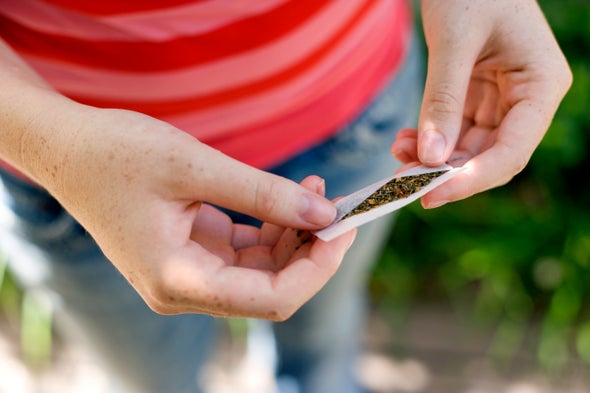First gene associated with cannabis abuse likely affects how people respond to the drug
By Karen Weintraub
Credit: Ian Hooten Getty Images
Danish researchers have for the first time identified a gene that increases the risk for cannabis use disorder.
About 10 percent of people who ingest cannabis, the most commonly used illicit substance in the world, suffer cravings and withdrawals when they try to stop their habit. All substance abuse is the result of a combination of environmental and genetic factors, but until now, none of those genetic factors had been identified.
The Danish researchers identified a single variant of the gene CHRNA2 (cholinergic receptor nicotinic α2 subunit), which affects the risk of becoming addicted to cannabis. The gene was identified by comparing the genomes of more than 2,000 people with the disorder against nearly 50,000 who do not have the condition. Publishing their results in Nature Neuroscience June 17, the researchers confirmed their finding by comparing it with a database of Icelandic volunteers, including 5,500 people with cannabis use disorder and 300,000 without.
The gene doesn’t make someone a pot smoker, but it can increase the risk of addiction for those who try cannabis, says Ditte Demontis, an associate professor at Aarhus University in Denmark, who led the work.
Demontis says she hopes that identifying genes involved will eventually lead to a better understanding of the biological mechanisms behind the disorder as well as a treatment for it. Larger population studies will eventually result in more genetic discoveries, she says, adding that she expects researchers will eventually find dozens more genes that play a role in the disorder. “Our gene variant is not enough, but it can be the first block of building the tower of information,” she says.
In people with other addictions, genes have been identified that relate to impulsivity, as well as their biological response to the drug. Although it’s not yet clear how the gene CHRNA2 increases someone’s risk of cannabis abuse, “I’m quite convinced that what we found is the genetic risk that affects how you react to the drug,” Demontis says.
So far, Demontis says she has only looked at genetic data for a relatively small group of northern Europeans. She has begun collaborating with U.S. scientists to gain access to their more diverse database. Using a larger database will help to find many more risk genes as well as perhaps genes connected to some populations but not others, she says.
The finding also needs to be confirmed against other databases, says Joel Gelernter, a professor of psychiatry at the Yale School of Medicine, who intends to look for the gene in his own data set.
“I think it’s quite likely that [this finding] adds something that’s really of interest for our biological understanding of the nature of cannabis dependence and why some people are more likely to become cannabis dependent than others,” says Gelernter, who was not involved in the new study.
The disorder affects about 1–1.5 percent of the general population.
The Danish researchers also took measures to ensure that the link between the gene and the disorder was not spurious. The study suggests that neither cigarette smoking nor schizophrenia was responsible for the connection to marijuana abuse, the researchers showed.
Gelernter says previous data shows that schizophrenia can increase the risk of cannabis use disorder and vice versa—suggesting that some genes may play a role in both. “One of the things underlying the relationship between cannabis use and schizophrenia could certainly be shared genetic risk,” he says.
This is not necessarily true for every individual who abuses marijuana.
Many more genes will need to be found before scientists can understand the big picture, says Howard Edenberg, a Distinguished Professor at Indiana University, who was not involved in the research, but who specializes in the genetics of substance abuse. “We know we’re missing a much larger part of the puzzle,” he says. Edenberg says he expects that some genes will be found to contribute to the risk of several forms of abuse while others are unique to specific conditions like alcoholism or cannabis use disorder.
With other forms of substance abuse, he says, scientists are close to reaching an inflection point where enough genes have been identified to provide a new understanding of the biology and behavior of addiction. Identifying one gene is not nearly enough for such an advance, he says, but is a necessary first step.

No comments:
Post a Comment